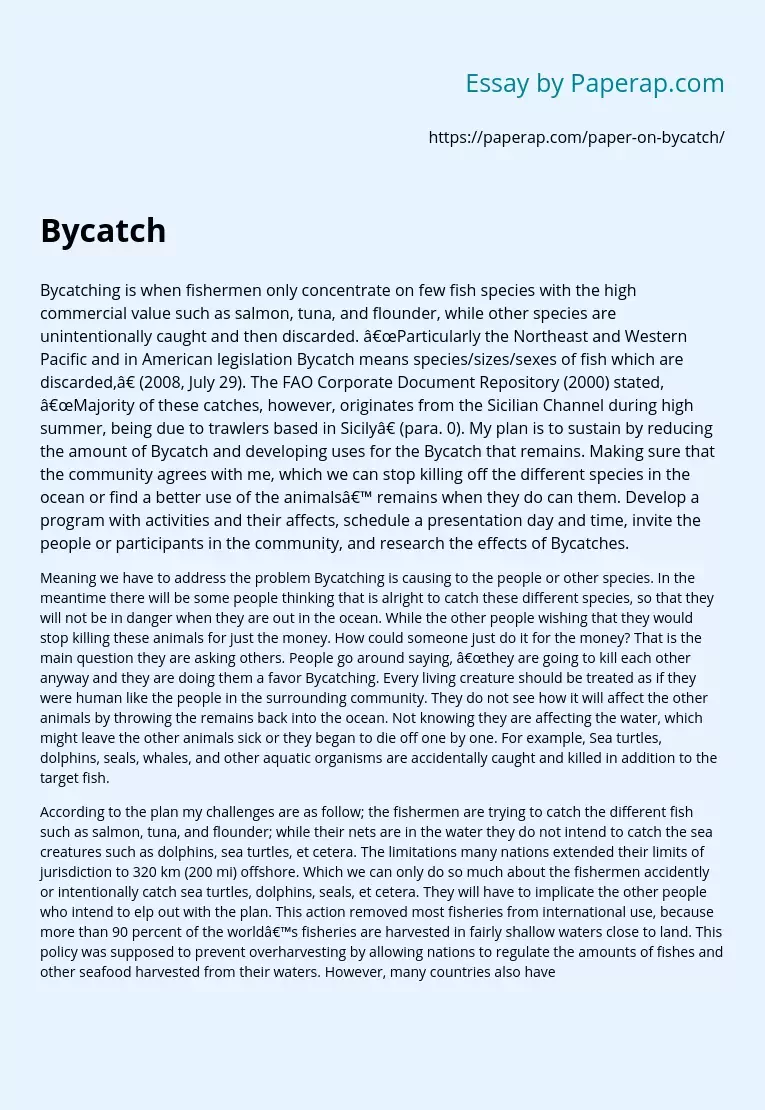Bycatching is when fishermen only concentrate on few fish species with the high commercial value such as salmon, tuna, and flounder, while other species are unintentionally caught and then discarded. “Particularly the Northeast and Western Pacific and in American legislation Bycatch means species/sizes/sexes of fish which are discarded,” (2008, July 29). The FAO Corporate Document Repository (2000) stated, “Majority of these catches, however, originates from the Sicilian Channel during high summer, being due to trawlers based in Sicily” (para. 0). My plan is to sustain by reducing the amount of Bycatch and developing uses for the Bycatch that remains.
Making sure that the community agrees with me, which we can stop killing off the different species in the ocean or find a better use of the animals’ remains when they do can them. Develop a program with activities and their affects, schedule a presentation day and time, invite the people or participants in the community, and research the effects of Bycatches.
Meaning we have to address the problem Bycatching is causing to the people or other species.
In the meantime there will be some people thinking that is alright to catch these different species, so that they will not be in danger when they are out in the ocean. While the other people wishing that they would stop killing these animals for just the money. How could someone just do it for the money? That is the main question they are asking others. People go around saying, “they are going to kill each other anyway and they are doing them a favor Bycatching.
Every living creature should be treated as if they were human like the people in the surrounding community. They do not see how it will affect the other animals by throwing the remains back into the ocean. Not knowing they are affecting the water, which might leave the other animals sick or they began to die off one by one. For example, Sea turtles, dolphins, seals, whales, and other aquatic organisms are accidentally caught and killed in addition to the target fish.
According to the plan my challenges are as follow; the fishermen are trying to catch the different fish such as salmon, tuna, and flounder; while their nets are in the water they do not intend to catch the sea creatures such as dolphins, sea turtles, et cetera. The limitations many nations extended their limits of jurisdiction to 320 km (200 mi) offshore. Which we can only do so much about the fishermen accidently or intentionally catch sea turtles, dolphins, seals, et cetera. They will have to implicate the other people who intend to elp out with the plan. This action removed most fisheries from international use, because more than 90 percent of the world’s fisheries are harvested in fairly shallow waters close to land. This policy was supposed to prevent overharvesting by allowing nations to regulate the amounts of fishes and other seafood harvested from their waters. However, many countries also have a policy of open management, in which all fishing boats of that country are given unrestricted access to fishes in national waters.
My plan will not put the fishermen out of a job, but to ensure that they are trying to watch out for catching the endanger species in their nets. If the fishermen did not have a job the people in the community will not be able to eat the fish and this may cause a riot or protest against them for trying to Bycatching. This will have scientist out of jobs also, because they are studying the species and how they are important. People would not know about these different species if they were not caught at all, which would have left everyone speechless.
For example, people were to get attacked by or came in contact with these species. They would not know what to do or what it was. My plan will not only save, reduce Bycatching, and find something to do with the remains but help the community. References Bycatch. (2008, July 29). In Wikipedia, The Free Encyclopedia. Retrieved 15:29, August 10, 2008, from http://en. wikipedia. org/w/index. php? title=Bycatch&oldid=228538447 FAO Corporate Document Repository. (2000). THE IMPACT OF FISHING ON VULNERABLE GROUPS AND HABITATS. Retrieved August 10, 2008, from http://www. fao. org/docrep/007/y5594e/y5594e04. htm#TopOfPage
Bycatching and Commercial Fishing. (2017, Dec 22). Retrieved from https://paperap.com/paper-on-bycatch/

